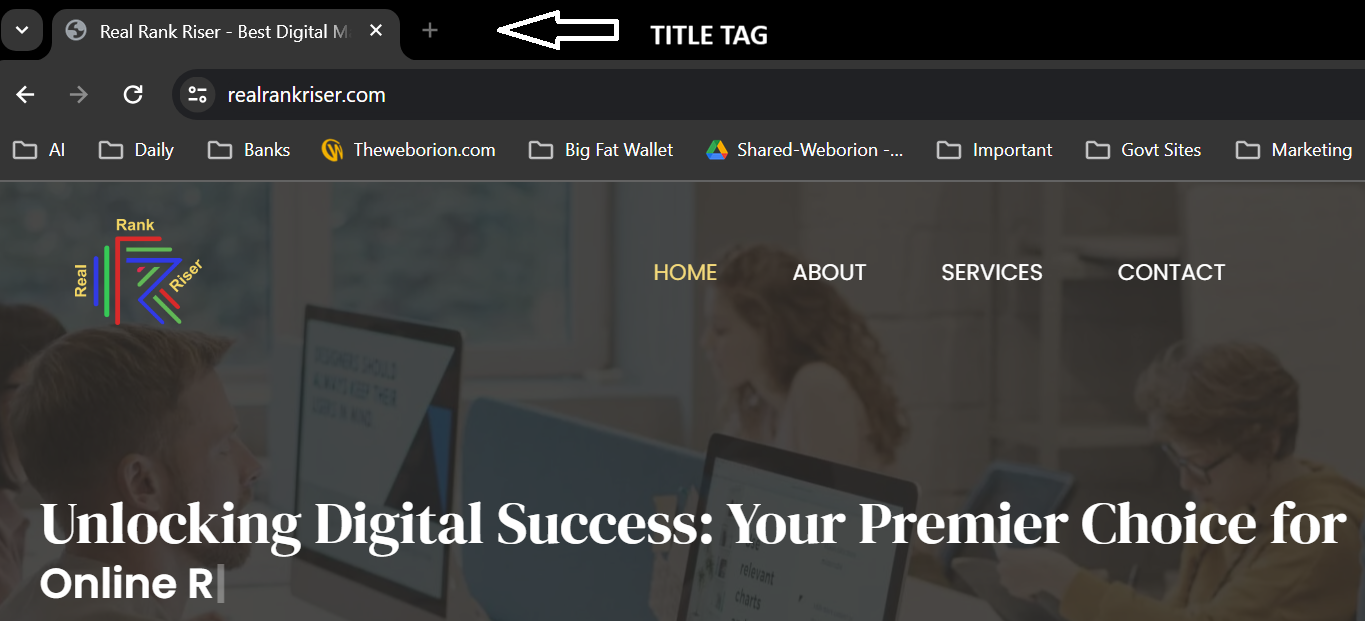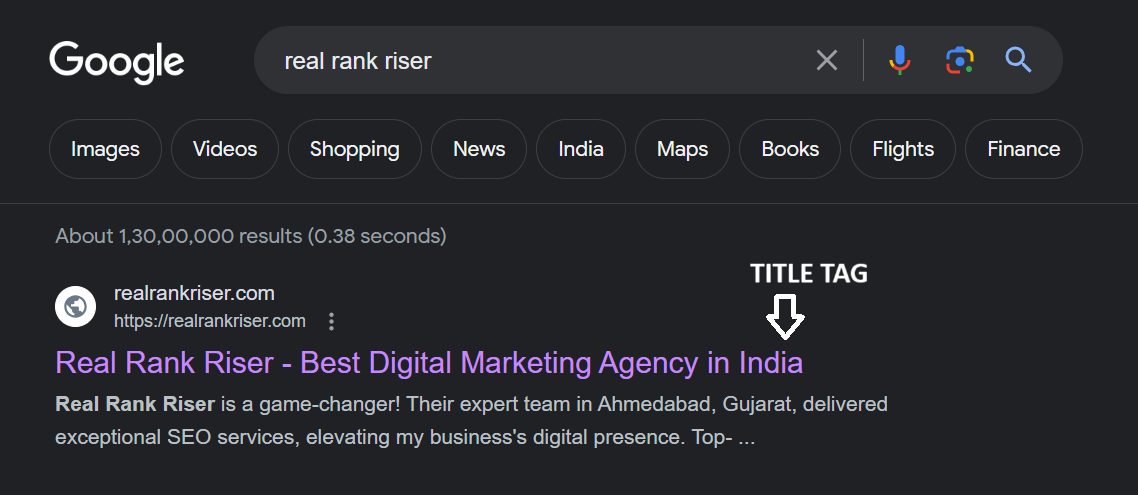Title Tag Optimization: Unlock Your Search Engine Visibility Potential
Introduction:
Think of your website as a hidden gem in the vast ocean of the internet. Title tags are the buoys marking its location, guiding search engines (and users!) straight to your door. Optimizing them is like polishing these buoys, making them shine brighter and attracting more visitors. Here’s why:
- Search Engine Savvy: Well-crafted titles help search engines understand your content, increasing your chances of appearing for relevant searches. They act like miniature summaries, highlighting the keywords users crave.
- Click Magnet: Imagine enticing headlines. That’s the power of optimized titles! They grab user attention, leading to more clicks and ultimately, more traffic to your website.
- Relevance Amplifier: Imagine searching for “best pizza recipe” and finding a title like “Grandma’s Secret Sauce Pizza.” You’d click, right? Relevant titles build trust and boost rankings by accurately reflecting your content.
- User Experience Champion: Clear titles set expectations, ensuring users land on the content they seek. This enhances their experience and keeps them coming back for more.
Title tags play a double game in your quest for online success, influencing both search engine rankings and click-through rates. Like whispers to search engines, they convey the essence of your page, using relevant keywords to climb the ladder of rankings. The higher you climb, the more likely your site pops up in relevant searches. But title tags are also salespeople, wooing users with their first impression. A compelling title, infused with relevant keywords and user intent, becomes an irresistible click magnet, drawing users in and boosting your click-through rate. It’s a delicate dance, balancing the needs of search algorithms with user appeal, but mastering it can unlock a surge in website traffic and propel your brand to the forefront of online visibility.
Below are some key strategies and tips for Title Tag Optimization to transform website rise above the noise and shine brighter than ever in the digital landscape!
Let’s understand Title Tag First:
Think of your website as a hidden gem in a vast library. Title tags are the library cards, guiding both librarians (search engines) and eager readers (users) to its location. But unlike bland cardboard, these cards hold immense power in the form of compelling headlines. Let’s delve deeper:
What are these magical title tags?
Imagine miniature summaries displayed in search results and browser tabs. Those are title tags, concise descriptions that encapsulate your page’s essence. They play a pivotal role in webpage optimization, acting as:
- Search Engine Beacons: By including relevant keywords, you guide search engines like Google to understand your content, increasing your chances of appearing in relevant searches. It’s like whispering the perfect keywords to attract attention.
- User Magnets: Think of captivating headlines in magazines. Well-crafted title tags act similarly, grabbing users’ attention and enticing them to click. A clear, informative title acts as the first impression, and a good first impression goes a long way!

Where do these title tags shine?
Title tags are displayed prominently in Search Engine Results Pages (SERPs), acting as clickable headlines that summarize your page. They’re also displayed in browser tabs, ensuring users know exactly what page they’re on.

Why are compelling title tag is crucial?
A dull title gets ignored, while an intriguing one begs to be explored. This translates to:
- Higher Search Rankings: Relevant and well-structured titles can improve your ranking for targeted keywords, bringing you closer to the top of SERPs.
- Increased Click-Through Rates (CTR): Enticing titles with relevant keywords and user intent in mind act like magnets, attracting users to click and explore your content.
Remember, title tags are more than just words; they’re powerful tools that influence both search engine visibility and user engagement. Optimize them wisely, and watch your website shine brighter than ever in the digital landscape!
Key Strategies for Title Tag Optimization:
The secret sauce of title tag optimization lies in understanding the power of target keywords. These are the terms users search for, and including them strategically in your titles is like unlocking a treasure chest of visibility.
Mastering the Keywords, Length, and Engagement Formula
Your website’s title tags might seem like small potatoes, but like tiny spices, they pack a powerful punch in the vast culinary competition of search engine results. Optimizing them is an art form, blending compelling keywords, conciseness, and captivating copy to attract both search engines and users. Let’s explore the recipe for success:
A. Mastering the Keyword Magic:
Imagine searching for “best pizza recipe.” A title like “Cooking Tips” wouldn’t trigger your taste buds, right? That’s the magic of relevant keywords. Include them strategically in your titles and watch your visibility soar.
How to Find the Right Keywords:
- Be a detective: Use tools like Google Keyword Planner or SEMrush to uncover hidden gems – keywords with high search volume and low competition.
- Think “long and specific”: Instead of “pizza,” target “easy homemade pizza dough recipe.” These long-tail keywords attract qualified traffic.Don’t keyword-stuff: Sprinkle, don’t smother! Overstuffing reads poorly and hurts rankings.
- Real-Life Example: Instead of “Organic Clothing,” opt for “Sustainable Bamboo T-Shirts: Eco-Friendly Comfort.” This title incorporates relevant keywords (“bamboo,” “eco-friendly”), caters to user intent (“t-shirts”), and is naturally descriptive.
B. Brevity is Sweet (and Essential):
Search engines have character limits for title tags (around 50-60 characters), so every word counts. Be concise!
Craft Compelling Titles:
- Hook them instantly: Use strong verbs, numbers, and specific details to pique curiosity.
- Avoid unnecessary words: Ditch prepositions, articles, and repetition. Every character is precious real estate.
- Real-Life Example: Instead of “Learn More About Yoga for Beginners,” opt for “5 Yoga Poses for Absolute Beginners – Find Your Zen in 10 Minutes.” This title is specific, actionable, and attention-grabbing, all within the character limit.
C. Captivate and Clickable:
Remember, your title is the first impression. Make it count!
Engagement is Key:
- Ask a question: “Can Yoga Reduce Stress? 7 Poses Proven to Calm Your Mind.” This sparks curiosity and encourages clicks.
- Highlight benefits: “Boost Energy Naturally with These 5 Superfood Smoothies.” Users are drawn to solutions.
- Use power words: “Unlock the Secrets of Baking Perfect Bread Every Time.” Words like “secrets” and “perfect” trigger interest.
- Real-Life Example: Instead of “Travel Blog,” opt for “Beyond Bucket List: Unforgettable Travel Experiences Await.” This title uses strong verbs, promises uniqueness, and invites exploration.
D. Description is Delicious:
A descriptive title is like a well-labeled dish – it tells you exactly what’s inside.
- Uniqueness Matters: Avoid generic titles like “Website Design.” Instead, showcase your unique offerings.
- Communicate Purpose: Tell users what they’ll find and how it benefits them.
- Real-Life Example: Instead of “Digital Marketing Services,” opt for “Grow Your Business Online: Expert Digital Marketing Solutions.” This title clarifies the service and its value proposition.
By mastering the art of keyword strategy, conciseness, and captivating copy, you can transform your title tags into irresistible bites that will leave both search engines and users wanting more. So, get creative, sprinkle in the right keywords, and watch your website climb the search engine ladder!
Avoiding the Pitfalls That Plague Your Rankings due to poor Title Tags
While vibrant signage is crucial, misleading advertisements will only drive them away. In the world of search engine optimization (SEO), common mistakes in title tag optimization can act as those misleading signs, hindering your website’s visibility and engagement. Let’s explore the top pitfalls to avoid:
A. Keyword Stuffing: The Overzealous Chef Ruining the Recipe:
Ever seen a dish smothered in spices, losing its original flavor? Keyword stuffing is similar. It involves forcing too many keywords into your title tags, making them unnatural and hindering both user experience and search engine rankings.
Why is it bad? Imagine searching for “Italian restaurant.” A title like “Italian Restaurant, Italian Food, Italian Cuisine, Italian Dishes” screams desperation, not deliciousness. Search engines penalize such practices, and users simply find them off-putting.
Tips for balance:
- Sprinkle, don’t smother: Include relevant keywords naturally, focusing on user intent.
- Focus on long-tail keywords: “Best authentic Italian pasta in Chicago” is specific and informative, unlike “Italian Restaurant.”
- Prioritize user experience: Would you click on a title that reads like a robot wrote it? Keep it natural and clear.
B. Vague Titles: The Blurred Sign Pointing Nowhere:
Imagine wandering around a market unsure where to go. Vague titles do the same for users. They fail to communicate the page’s purpose, leaving users confused and unwilling to click.
Why are they bad? A title like “Travel Tips” offers no specifics. Would you click on it seeking budget travel hacks or luxury vacation recommendations? Users need clarity to engage.
Tips for clarity:
- Target a specific audience: “Budget Travel Hacks for Backpackers in Southeast Asia” attracts a clear demographic.
- Highlight unique value: “Unlock Hidden Gems: Off-the-beaten-path Adventures in Europe” showcases your unique content.
- Communicate benefits: “Stress-Free Vacation Planning: Expert Tips for a Relaxing Getaway” promises a solution.
C. Neglecting Updates: The Outdated Menu No One Orders From:
Just like menus need seasonal updates, title tags too require regular attention. Failing to optimize them for changes in content or user behaviour means missing out on potential visibility.
Why is it important? If your business now offers vegan options, your “Italian Restaurant” title won’t attract vegan searches. Update accordingly!
Tips for freshness:
- Monitor search trends: Use tools like Google Search Console to see what users are searching for.
- Optimize for new content: Update titles when adding new products, services, or blog posts.
- Review and refine: Regularly evaluate titles for performance and adjust as needed.
Remember, effective title tags are a delicate balance between keyword optimization, user experience, and freshness. By avoiding these common pitfalls and embracing the tips above, you can transform your website’s signage into clear, enticing attractions that will draw both search engines and users right to your virtual door.
Tools and resources for optimizing title tags.
Conquering the search engine landscape requires an arsenal of powerful tools, and when it comes to optimizing your title tags, the right ones can be the difference between victory and defeat. But with a plethora of options available, choosing the right ones can be overwhelming. Fear not, intrepid adventurer! This guide will equip you with the knowledge and tools to streamline your title tag optimization process and boost your search engine visibility.
A. Scouting the Terrain: Popular Tools and Resources:
- Keyword Research Powerhouses:
- Google Keyword Planner: Free access to search volume data and keyword suggestions directly from Google.
- SEMrush: Offers comprehensive keyword research features, including competition analysis and long-tail keyword suggestions.
- Ahrefs: Another heavyweight contender, providing in-depth keyword research, competitor analysis, and backlink tracking.
- Title Tag Analysis and Optimization:
- Yoast SEO, Rankmath etc. : A popular WordPress plugins that analyzes your title tags for length, keyword usage, and readability, offering suggestions for improvement.
- MozBar: A browser extension that highlights various SEO metrics, including title tag analysis, directly on search results pages.
- SERPsim: Simulates how your title tags will appear in search results, helping you optimize for character length and visual impact.
B. Wielding the Tools Effectively:
These tools are like powerful swords, but wielding them with skill is key. Here’s how:
- Start with Keyword Research: Use tools like Google Keyword Planner and SEMrush to identify relevant keywords with high search volume and low competition.
- Craft Compelling Titles: Don’t just rely on tools! Analyze competitor titles and use your creativity to write informative, engaging titles that incorporate your target keywords naturally.
- Leverage Title Tag Analysis: Use Yoast SEO or MozBar to check your title tags for length, keyword density, and other SEO factors, making adjustments as needed.
- Visualize Success: Utilize SERPsim to see how your title tag will appear in search results, ensuring it stands out and captures user attention.
C. Choosing Your Weapon:
With so many options, how do you choose the right tools? Consider your needs, budget, and technical expertise. For beginners, free tools like Google Keyword Planner and Yoast SEO are great starting points. As you progress, consider paid options like SEMrush or Ahrefs for more advanced features.
Remember: Tools are powerful allies, but ultimately, your creativity and strategic thinking are the key to crafting truly effective title tags. Use these tools to guide your decisions, not replace them.
Conclusion :
Throughout this journey, we’ve explored the captivating world of title tag optimization, unveiling its immense power in unlocking search engine visibility for your website. Remember, these little titles act as billboards, attracting both search engines and users.
By incorporating the key strategies and tips we’ve discussed, you can transform your title tags from bland descriptions to irresistible magnets. Include relevant keywords naturally, keep them concise and captivating, and avoid the pitfalls of stuffing or vagueness. Remember, freshness is key – regularly review and adapt your titles to reflect changes and maintain momentum.
The tools and resources available are your allies in this optimization quest. Choose wisely, wield them skillfully, and unleash your creativity to craft titles that grab attention and propel you to the forefront of search results.
So, adventurer, don’t allow your website to fade into the vast digital expanse. Harness the potential of title tag optimization, apply these tactics, and witness your site ascend the search engine ranks it rightfully deserves! Best of luck and happy optimizing!”

